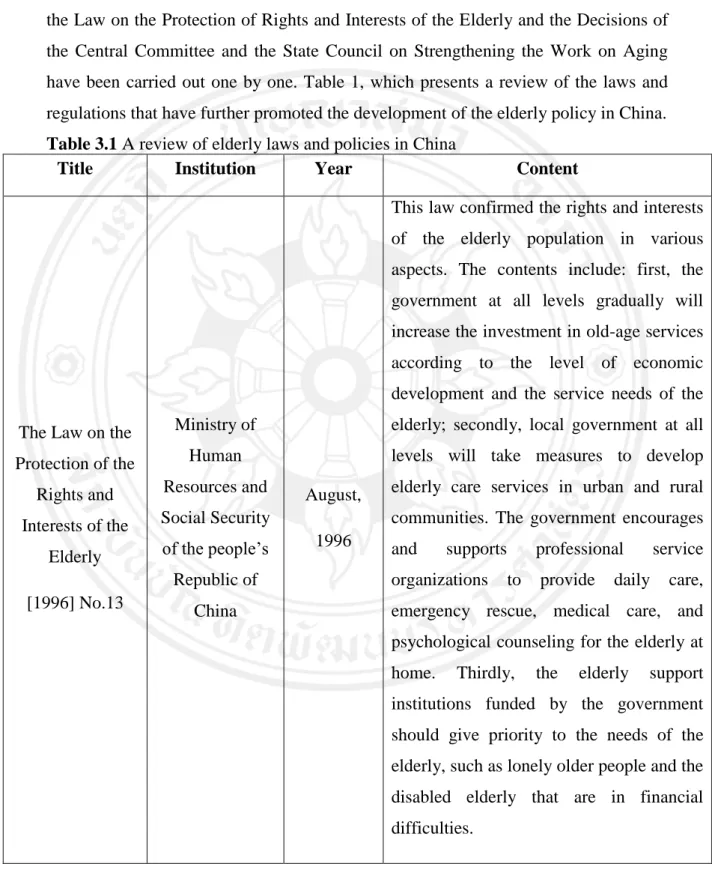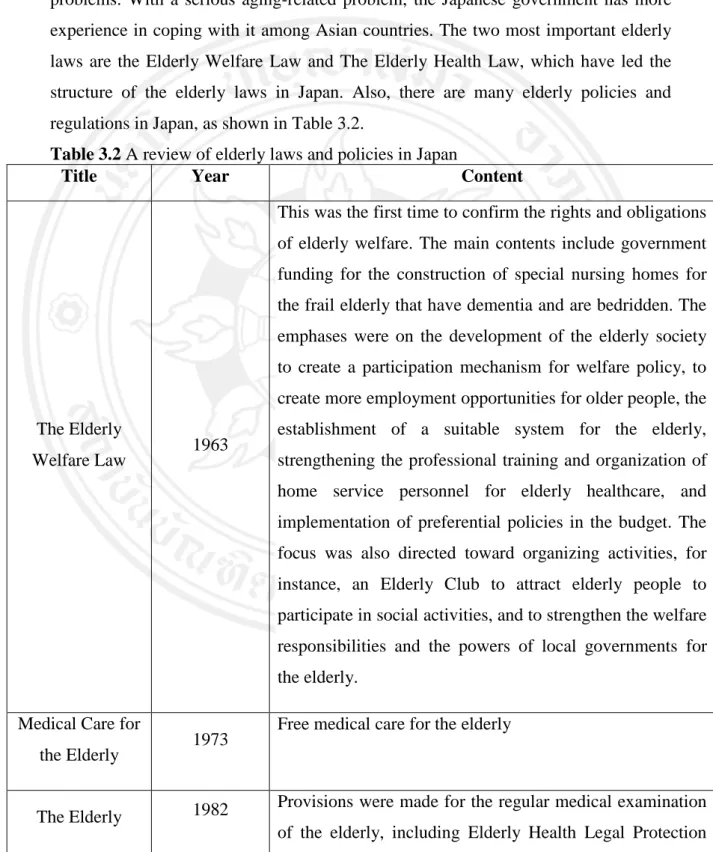The examination board approved this thesis, which partially fulfilled the conditions for obtaining the master's degree in management. The purpose of the study was to (1) identify the problem of aging in China, (2) compare the policy on the elderly in China and Japan, and (3) provide policy recommendations for the Chinese government. By consolidating China's situation, the Chinese government should create a way to pay attention to improving policies for the elderly and implement targeted measures for all stages of aging.
Piboon Puriveth who gave me the golden opportunity to do this wonderful project on the topic THE ELDERLY PROBLEMS AND POLICIES IN CHINA: A COMPARISON WITH JAPAN, who also helped me to do a lot of research and know so many new things came I am very grateful to them. Secondly, I also want to thank my parents and friends who helped me a lot to finalize this project within the limited time frame.
INTRODUCTION
Related data were collected from the World Bank website and the government website, and policy documents and literature on the elderly were examined. It was expected to provide beneficial suggestions to the Chinese government to reform the aging situation and improve elderly services in the future. The study also sought to encourage private businessmen to develop the aging industry and create more benefits.
Because the aging industry is a very potential industry that has less risk and it will get a lot of support from the government.
AGING PROBLEMS IN CHINA
The increasing demands for medical treatment
For example, in Beijing, communities carry out the construction of Chinese medicine elderly health care, the community health service center, the elderly care center opened the traditional Chinese medicine health care service area and cultivated Chinese medicine technical personnel . Also, different types of drugs were included in the community drug directory, this measure ensured that community health service agencies are provided with drugs. Elderly patients in the community can benefit from the usual convenience of medicines through the community pilot.
The local government buys anti-lost wristband services to protect the safety of the elderly disabled in 2016, and the free distribution is 10,000.
The empty-nest family problem
Therefore, in 2013, a new rule on the elderly was added to the Protection of the Rights and Interests of the Elderly Act (2013), which allows the elderly to sue their children for infrequent visits. If the seniors win the lawsuit, their children will be added to the credit blacklist, and the court will enforce the decision by revoking the children's library cards or affecting their applications for bank accounts or obtaining loans.
The increased pressure on long-term nursing services
LAWS AND POLICIES FOR THE ELDERLY
The elderly laws and policies in China
5,000 to extend emergency rescue services to the home and to protect the safety of the elderly living alone. After the Fourth National Working Committee on Aging was convened in 2002, the Law on the Protection of Rights and Interests of the Elderly and the decisions of the Central Committee and the State Council for Strengthening the Work on Aging were carried out one by one. Table 1, which provides an overview of the laws and regulations that have further promoted the development of the elderly policy in China.
The contents include: first, the government at all levels will gradually increase investment in elderly services according to the level of economic development and the service needs of the elderly; second, local government at all levels will take measures to develop elderly care services in urban and rural communities. Third, the elderly support agencies funded by the government should give priority to the needs of the elderly, such as lonely elderly people and disabled elderly who are in financial difficulty. It contains decisions to improve the social security system and gradually establish security mechanisms with sustained efforts of the nation, society and the family to ensure medical and other basic needs for the elderly.
To strengthen community building, we must rely on the development of community services for the elderly, and community services for the elderly must be improved. Institutions are required to provide appropriate and preferential services to the elderly, such as reducing the overall outpatient fee for the elderly in poor families, providing free medical examinations, etc., as well as providing preferential treatment in relation to the services of human rights. provide free time and entertainment, and try to enrich. spiritual and cultural life of the elderly. He also proposed that in rural areas, the consolidation of the supporting function of the family should be continued, where the conditions should explore the establishment of appropriate rural security systems of the elderly and the minimum livelihood security policy.
At the urban and rural community support level, it focuses on building elderly care centers, elderly activity centers, mutual assistance elderly centers, promoting community service facilities to improve the function of elderly care, and basic coverage of urban communities and half of the rural communities. The content here has expanded from 50 items to 85 items, including repositioning family support for the elderly, focusing on the spiritual needs of the elderly, and gradually establishing a multi-level pension and health insurance system, paying more attention to the daily services of the the elderly, and gradually increasing preferential treatment for the elderly, promoting the construction of livable environments, and guaranteeing the rights of the elderly to participate in public affairs.

The elderly laws and policies in Japan
In terms of aging problems, China and Japan have elements in common, such as the rapid development of aging and the serious degree of the aging society there. The two most important elderly laws are the Elderly Welfare Law and The Elderly Health Law, which guided the structure of the elderly laws in Japan. The main content includes government funding for the construction of special nursing homes for frail elderly people who have dementia and are bedridden.
Emphasis was placed on developing the society of the elderly to create a participatory mechanism for social policy, creating more employment opportunities for the elderly, establishing an appropriate system for the elderly, strengthening professional training and organizing staff for the care of the elderly at home. healthcare and implementation of preferential policy in the budget. The focus was also on organizing activities, such as the Senior Citizens' Club, to attract the elderly to participate in social activities and to strengthen the social responsibility and competence of local authorities for the elderly. Elderly 1982 Regular medical examinations of the elderly were prescribed, including legal protection of the health of the elderly.
The above series of policies and laws on the welfare of the elderly have resulted in a gradual improvement and systematization of public pension, health and nursing policy. This provided a system for the elderly to fill the period between retirement and to manage the process of benefits for the elderly under the health system. This promoted the insurance and welfare of the elderly and increased the number of facilities for special care homes to 2.9 million and the number of staff on site at the Care and Support Center to 170,000, with a short-term care facility that could accommodate up to 1.7 million people.
This changed the traditional dependence on government in the past, combined with insurance, cost sharing by government, socially and individually. In the former group, the burden of medical costs was placed on the financial system, while in the latter group an independent, higher age was applied.

COMPARISON OF ELDERLY POLICY BETWEEN CHINA AND
In China, the Law on the Protection of the Rights and Interests of the Elderly is a guideline. The rural collective economic base is weak, so it cannot offer more means to solve the problem of the elderly living safely. In Japan, the law can be divided into two categories; one is the Elderly Health Act and the other is the Elderly Care Act.
It is necessary to formulate laws on elderly care, which should reflect the special needs and requirements of the elderly. From a system design point of view, the Chinese government should consider the medical care, home care, the care environment and the demands of the elderly. Most of the community clinics have especially poor equipment and a low level of medical technology, which makes it difficult to satisfy the medical needs of the elderly residents.
Although most elderly people in Japan are willing to continue living at home, community elderly care centers are the main channel for providing care to the elderly. It is necessary for the Chinese government to build a community support network for the elderly. Under Japan's elderly health law, patients aged 65 or older are responsible for more.
34;Kyoto Nursing Home." Its bottom has a medium-sized public hospital where the elderly can receive convenient medical treatment. At the same time, the public area occupies one third of the nursing home, which is an entertainment and social area for the elderly. The elderly have the freedom to choose their own lives according to their economic basis, lifestyle and social status (Kim, 2003).
The Chinese government should build elderly apartments in a beautiful and convenient location and then sell or rent them to the elderly at a low price.
CONCLUSION
Second, it will help private business operators to participate in the aging market and understand the requirements of the elderly customers, create good products and facilities to promote the quality of life of elderly people. This will have favorable results not only to develop the aging industry but also to earn good profits. Third, this paper will help the general public because it will encourage them to respect older people and pay more attention to their parents, which will make them happier.
Finally, this paper provides useful information and resources related to aging and elder health care policies that will inspire others to research the aging industry in future studies. Decision of the Central Committee of China and the State Council on strengthening work in the field of aging. Intergenerational transmissions and living arrangements of elderly people in rural China: Implications for psychological well-being.